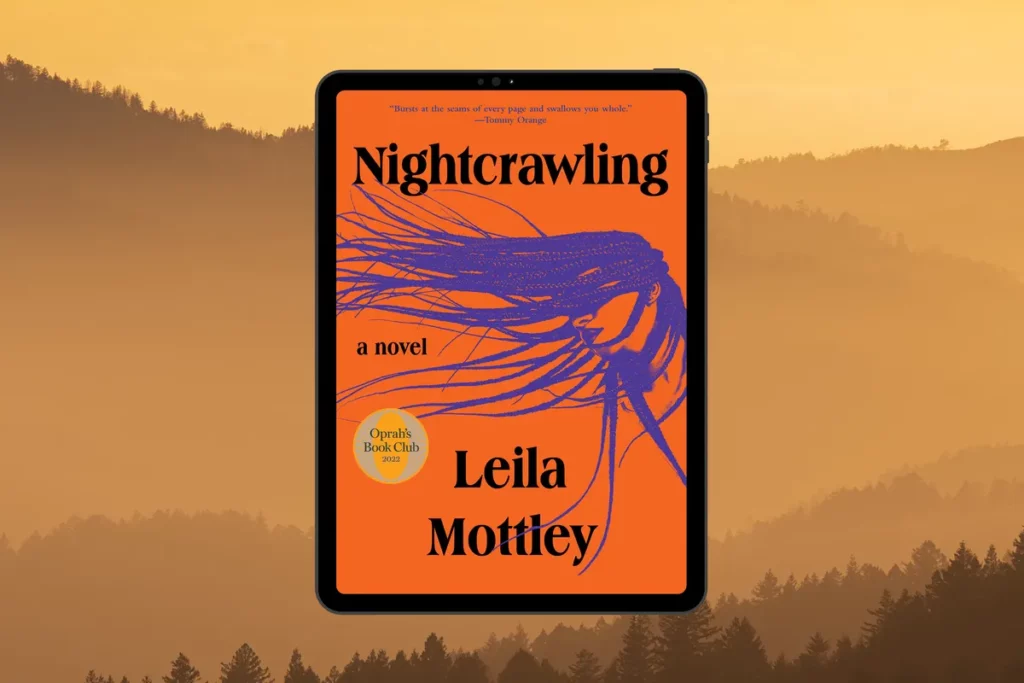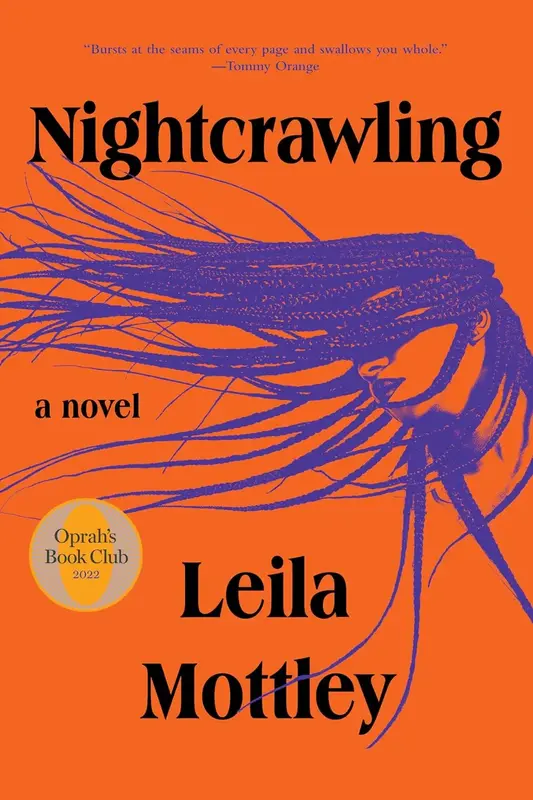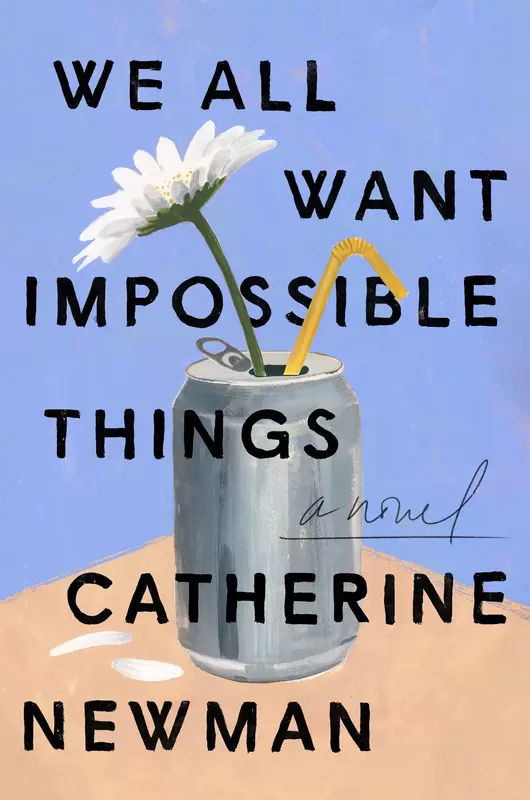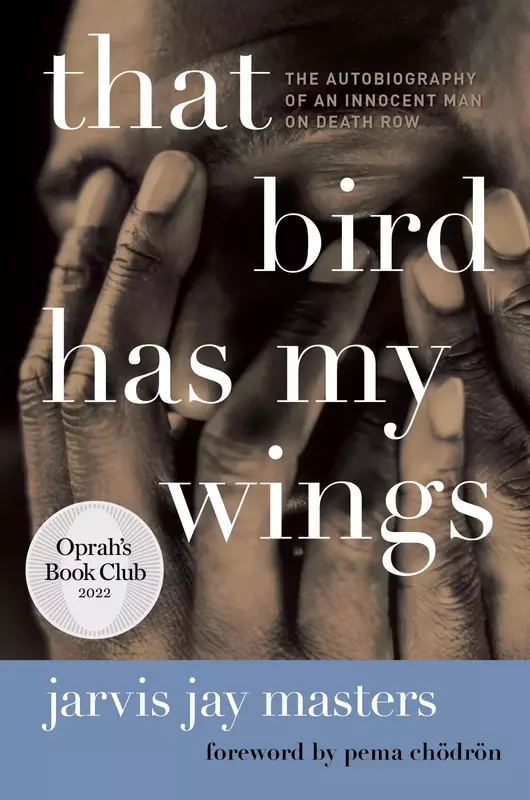This post may contain affiliate links. Read more here.

Book club questions for Nightcrawling by Leila Mottley delve into the raw and gritty reality of life in East Oakland, brought to life in vivid detail within the pages of this compelling debut novel.
The novel follows Kiara and her brother, Marcus, who struggle to make ends meet in an apartment complex known as the Regal-Hi. Both have dropped out of high school, and their family is marked by loss and incarceration.
Nightcrawling by Leila Mottley
While Marcus dreams of rap stardom, Kiara is determined to find work to support them and care for a young boy left abandoned by his mother. But when a chance encounter leads Kiara to an unexpected job as a nightcrawler, her life takes a dramatic turn.
With its raw beauty, electrifying intensity, and piercing vulnerability, Nightcrawling has been hailed for its captivating storytelling and unique voice.
This reading guide contains book club discussion questions for the Nightcrawling by Leila Mottley.
Have a wonderful book club discussion! ✨
Summary | Ending Explained | Book Club Questions
The Synopsis
Kiara and her brother, Marcus, are scraping by in an East Oakland apartment complex optimistically called the Regal-Hi. Both have dropped out of high school, their family fractured by death and prison
But while Marcus clings to his dream of rap stardom, Kiara hunts for work to pay their rent—which has more than doubled—and to keep the nine-year-old boy next door, abandoned by his mother, safe and fed. One night, what begins as a drunken misunderstanding with a stranger turns into the job Kiara never imagined wanting but now desperately needs: nightcrawling. Her world breaks open even further when her name surfaces in an investigation that exposes her as a key witness in a massive scandal within the Oakland Police Department.
Rich with raw beauty, electrifying intensity, and piercing vulnerability, Nightcrawling marks the stunning arrival of a voice unlike any we have heard before.
About the Author
Leila Mottley is a prominent American novelist and poet, known for her powerful and evocative writing that sheds light on important social issues. Born and raised in Oakland, California, Mottley’s debut novel, Nightcrawling, has garnered widespread acclaim, earning her the distinction of being a New York Times Bestseller, an Oprah’s Book Club selection, and a nominee for the prestigious Booker Prize.
At the age of 16, Mottley was named the Youth Poet Laureate of Oakland, California, and her poetry has been featured in The New York Times. She co-wrote and starred in the documentary short film, When I Write It, which was an official selection of the Tribeca Film Festival in 2020. Despite dropping out of Smith College, Mottley’s talent and dedication to storytelling have propelled her into literary success.
Mottley’s debut novel, Nightcrawling, takes readers into the world of Kiara Johnson, a young black adult navigating the challenges of police sexual violence, adultification, and a family affected by the criminal justice system. With a unique voice and keen insight into the complexities of contemporary society, Mottley’s writing captivates readers with its authenticity, vulnerability, and profound exploration of human experiences.
Book Club Questions for Nightcrawling
I hope you and your book club will enjoy my discussion reading guide for Nightcrawling by Leila Mottley.✨
- Kiara and Marcus are faced with numerous challenges, including poverty, abandonment, exploitation, and racism. How do these challenges shape their actions and decisions throughout the story? What choices do they make in order to survive, and how do these choices affect their relationships and their sense of self?
- Nightcrawling explores the theme of found family, with Kiara stepping into a motherly role for the abandoned boy next door. How does Kiara’s relationship with the young boy evolve over the course of the story, and how does it impact her own understanding of family and belonging?
- Kiara’s job as a nightcrawler, which involves exploiting her own body, raises complex ethical questions. How does Kiara grapple with the moral implications of her job? How do her motivations and justifications for engaging in this work change over time?
- The story is set in Oakland, California, and touches on issues of gentrification and police corruption. How does the setting of the Regal-Hi apartment complex reflect larger societal issues in Oakland, and what commentary does the author make about these issues through the characters and their experiences?
- Marcus’s pursuit of rap stardom is a central theme in the story. How does his dream of becoming a successful rapper impact his relationship with Kiara and their shared struggles? What does his pursuit of fame reveal about his character and his values?
- Kiara’s reflection on her unlocked door on page 82, “Houses give away all their secrets at the door. Dee’s is full of scratches. Mine doesn’t have a working lock no more,” hints at the symbolism of safety and vulnerability in the novel. Discuss the significance of Kiara’s unlocked door and how it reflects her quest for safety and security in a world that constantly puts her at risk. Analyze the ways in which Kiara attempts to find and create safety for herself and Trevor, and how it shapes her character development and the overall themes of the story.
- Kiara becomes a key witness in a scandal involving the Oakland Police Department, which exposes her to danger and puts her in a difficult position. How does Kiara navigate this situation, and what sacrifices does she have to make in order to seek justice and protect herself and her loved ones?
- Nightcrawling is written in a poetic and lyrical style, with vivid descriptions and powerful imagery. How does the author’s use of language contribute to the overall tone and atmosphere of the story? What do you think the author is trying to convey through her unique writing style?
- The story delves into themes of vulnerability, resilience, and the search for identity. How do these themes intersect in the lives of the characters, particularly Kiara, as she grapples with her past, present, and future? How do their experiences of vulnerability and resilience shape their understanding of themselves and their place in the world?
- In the absence of parental figures, Kiara has to create her own family, relying on chosen connections and relationships. Reflect on Kiara’s journey in building her chosen family, considering the members and how they support each other. Discuss the themes of family, blood ties, and the importance of human connections in the novel, and analyze how Kiara’s perception of family evolves throughout the story.
- Nightcrawling addresses issues of trauma and its effects on individuals and communities. How do the characters in the story cope with trauma, and how does it impact their relationships and actions? What messages or insights do you think the author is trying to convey about the effects of trauma and the process of healing?
- The story raises questions about the nature of power, particularly in the context of gender, race, and socio-economic status. How do the characters in Nightcrawling navigate power dynamics in their relationships and interactions with others? How do societal power structures influence their choices and experiences, and what commentary does the author make about power in the story?
- As you delved deeper into Nightcrawling, did your perception of Kiara and Alé’s relationship evolve in unexpected ways? How did their interactions, initially fraught with misunderstandings and miscommunication, transform throughout the novel? Did you notice moments of genuine connection, empathy, or intimacy between them? How did their differences in social class and race impact their relationship dynamics, and how did these dynamics contribute to the larger themes and messages conveyed in the book? Share your personal reflections on the complexities of Kiara and Alé’s relationship and how it resonated with you as a reader.
- Marcus’s decision to bail out Cole instead of himself came as a surprise to many readers. Did you anticipate this choice? What do you think motivated Marcus to make this decision, considering the risks and consequences involved? How did this choice shed light on Marcus’s character, his values, and his relationships with both Cole and Kiara? Explore your own thoughts and emotions about this pivotal moment in the story and how it impacted your perception of Marcus as a character. Reflect on the broader themes of sacrifice, loyalty, and familial bonds in Nightcrawling, and share your insights on the significance of Marcus’s decision in the context of the novel.
- Kiara’s repeated statement during her grand jury testimony, “I was a child,” holds profound importance in Nightcrawling. Why do you think it was crucial for Kiara to acknowledge her youth in the midst of the events that unfolded in the novel? How did her recognition of her childhood experiences relate to larger themes of innocence, vulnerability, and systemic injustice? Share your thoughts on the emotional weight of this statement and its impact on your understanding of Kiara’s character and her place in the story. Discuss the ways in which this aspect of Kiara’s testimony resonated with you personally and how it shaped your perception of her journey throughout the novel.
- The recurring imagery of water in Nightcrawling, from the swimming pool in Kiara’s apartment complex to the San Francisco Bay and the Pacific Ocean, serves as a powerful symbol throughout the novel. Discuss the significance of these bodies of water to Kiara and how they manifest in her emotional state. Analyze how Kiara’s perception of the pool changes from the beginning to the end of the story, and how it reflects her evolving journey and growth as a character.
- Oakland is depicted vividly in Nightcrawling, with images of both development and underdevelopment contrasting each other within the city. Explore the imagery of Oakland that stands out to you the most and how it contributes to the overall themes of the novel. Drawing from your own experiences, consider if your hometown can be described in similar ways and discuss the impact of urban development on communities and individuals.
- In Nightcrawling, Kiara reflects on watching Camila dance and realizing that she is not as free as she thinks she is. This leads to a comparison between the protection Demond provides Camila and the protection the police department provides Kiara. Discuss how these parallels highlight the themes of safety and freedom in the novel. Are either woman truly safe or free? What are the implications of their respective situations?
- The novel depicts Kiara’s father’s experiences with the Oakland Police Department as a Black Panther, as well as Kiara’s own experiences and those of the sex workers she encounters. Compare and contrast these experiences. In what ways are they similar, and in what ways are they different? How do these experiences shed light on issues of race, power, and systemic injustice within the community and the police department?
- Nightcrawling is narrated from Kiara’s first-person perspective. Do you think it is important for the story to be told from her point of view? How does Kiara’s perspective shape your understanding of the events and characters in the novel? How would the story be different if it was told from a different character’s perspective? Consider the impact of voice, agency, and subjectivity in shaping the narrative.
- Despite their strained relationships with their parents, Kiara and Marcus are influenced by their behaviors and personalities. Discuss the ways in which Kiara and Marcus inherit certain traits from their mother and father, both positive and negative. How do these inherited traits shape their actions and decisions throughout the novel? What does this reveal about the complexities of family dynamics and the impact of upbringing on individuals?
- Marsha is a significant character in Kiara’s life, and their relationship undergoes development throughout the novel. Describe your impressions of Marsha and how her relationship with Kiara evolves. What steps does Marsha take to gain Kiara’s trust, and how does their relationship change as a result? In what ways does Marsha perceive Kiara accurately, and in what ways is she blind to her experiences? Analyze the dynamics of this relationship and its significance in Kiara’s journey.
- Explore the different degrees of success and survival that Kiara observes in the characters around her, such as Alé, Cole, and Uncle Ty. Discuss their individual struggles, motivations, and actions, and how they reflect the broader social and economic challenges faced by marginalized communities. Analyze how these characters contribute to Kiara’s understanding of the world and her place in it.
- Nightcrawling is interspersed with flashbacks that highlight Kiara’s connection with her big brother, Marcus. Compare and contrast the Marcus in the flashbacks with the Marcus who interacts with Kiara in the timeline of the story. Discuss Marcus’ role as a brother, the ways in which he supports Kiara, and the ways in which he fails her. Analyze the complexities of sibling relationships, the impact of trauma on familial bonds, and the themes of loyalty and betrayal in the novel.
- Describe in detail the circumstances that lead to Kiara’s decision to become a nightcrawler. Explore the choices, challenges, and motivations that drive her to take on this risky job, and how it changes her life and perspective. Analyze the themes of survival, desperation, and agency in Kiara’s decision, and how it reflects the larger socio-political context of the novel.
- The grand jury’s verdict is a climactic moment in Nightcrawling that can evoke strong emotional responses. How did you react to the outcome of the grand jury’s decision? What thoughts and feelings did it stir in you as a reader? Reflect on the implications of the verdict for the characters and the broader themes of the book, such as the criminal justice system, power dynamics, and the challenges faced by marginalized communities. Did this moment raise questions or insights for you about real-world issues, and how did it impact your overall understanding and appreciation of the novel? Share your personal reactions and reflections on this impactful moment in Nightcrawling.
- Leila Mottley’s background as a poet adds a unique dimension to her storytelling in Nightcrawling. Take the time to engage with her poetry, whether by reading or listening to it, and reflect on the elements of her poetic style that you notice being incorporated into the novel. How does Mottley’s use of language, imagery, metaphor, and other poetic devices enrich the prose and contribute to the overall tone, style, and impact of Nightcrawling? Share your observations on the ways in which Mottley’s poetic voice influences her storytelling in the novel, and how it adds depth, complexity, and a distinctive voice to the narrative.
Selected Reviews for Nightcrawling
“Unflinching . . . Essential to understanding how maddeningly elusive justice can be.” —San Francisco Chronicle
“Stunning . . . Kiara is an unforgettable dynamo, and her story brings critical human depth to conversations about police sexual violence.” —Booklist (starred)
“Leila Mottley’s commanding debut, inspired by the life events of one woman’s struggle for body and soul against crushing exploitation, is fierce and devastating, rendered with electrifying urgency by this colossal young talent.” —Ayana Mathis
“Nightcrawling really is a powerful, poignant story worth your attention . . . Revelatory . . . My god—that voice. It’s sometimes too painful to keep reading, but always too urgent to stop.” —Ron Charles, Washington Post
“Kiara’s voice—simultaneously childlike, lyrical, and fierce—is the most unforgettable element of Nightcrawling.” —Mother Jones
Additional Recommendations
Hope you enjoyed my book club discussion questions and reading guide for Nightcrawling by Leila Mottley!
Here are some more of my book club recommendations:
Panenka by Ronan Hession
His name was Joseph, but for years they had called him Panenka, a name that was his sadness and his story. Panenka has spent 25 years living with the disastrous mistakes of his past, which have made him an exile in his home town and cost him his dearest relationships.
Now aged 50, Panenka begins to rebuild an improvised family life with his estranged daughter and her seven year old son. But at night, Panenka suffers crippling headaches that he calls his Iron Mask.
Faced with losing everything, he meets Esther, a woman who has come to live in the town to escape her own disappointments. Together, they find resonance in each other’s experiences and learn new ways to let love into their broken lives.
We All Want Impossible Things by Catherine Newman
For lovers of Meg Wolitzer, Maria Semple, and Jenny Offill comes this raucous, poignant celebration of life, love, and friendship at its imperfect and radiant best.
Edith and Ashley have been best friends for over forty-two years. They’ve shared the mundane and the momentous together: trick or treating and binge drinking; Gilligan’s Island reruns and REM concerts; hickeys and heartbreak; surprise Scottish wakes; marriages, infertility, and children. As Ash says, “Edi’s memory is like the back-up hard drive for mine.”
But now the unthinkable has happened. Edi is dying of ovarian cancer and spending her last days at a hospice near Ash, who stumbles into heartbreak surrounded by her daughters, ex(ish) husband, dear friends, a poorly chosen lover (or two), and a rotating cast of beautifully, fleetingly human hospice characters.
As The Fiddler on the Roof soundtrack blasts all day long from the room next door, Edi and Ash reminisce, hold on, and try to let go. Meanwhile, Ash struggles with being an imperfect friend, wife, and parent—with life, in other words, distilled to its heartbreaking, joyful, and comedic essence.
For anyone who’s ever lost a friend or had one. Get ready to laugh through your tears.
That Bird Has My Wings by Jarvis Jay Masters
The moving memoir of a Death Row inmate who discovers Buddhism and becomes an inspirational role model for fellow inmates, guards, and a growing public
In 1990, while serving a sentence in San Quentin for armed robbery, Jarvis Jay Masters was implicated as an accessory in the murder of a prison guard. A 23-year-old Black man, Jarvis was sentenced to death in the gas chamber. While in the maximum security section of Death Row, using the only instrument available to him—a ball-point pen filler—Masters’s astounding memoir is a testament to the tenacity of the human spirit and the talent of a fine writer.
Offering us scenes from his life that are at times poignant, revelatory, frightening, soul-stirring, painful, funny and uplifting, That Bird Has My Wings tells the story of the author’s childhood with parents addicted to heroin, an abusive foster family, a life of crime and imprisonment, and the eventual embracing of Buddhism. Masters’s story drew the attention of luminaries in the world of American Buddhism, including Pema Chodron, who wrote a story about him for O Magazine and offers a foreword to the book.
Thirty-two years after his conviction, Masters is still on Death Row. A growing movement of people believe Masters is innocent, and are actively working within the legal system to free him.
Thank you for reading my book club discussion questions and as always, happy reading! ❤️



